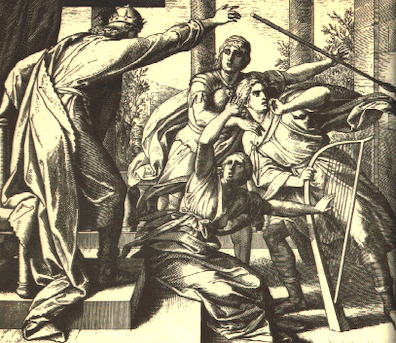When the narrator of Cyclops identifies his current
occupation as "Collector of bad and doubtful debts," he
mockingly recalls the laments in Samuel when David learns of
the battlefield deaths of King Saul and his son Jonathan: "The
beauty of Israel is slain upon thy high places: how all the
mighty are fallen!" (2 Samuel 1:19); "How are
the mighty fallen in the midst of the battle! O Jonathan, thou
wast slain in thine high places" (1:25); "How are the mighty
fallen, and the weapons of war perished!" (1:27).
David's storied friendship with Jonathan, his popularity as a
military commander, the jealous persecution to which Saul
subjects him out of fear that David may take his crown, the
loss of both the feared father and the loved son in an
instant, and the consequent elevation of David to the throne,
make this one of the great stories of the Hebrew Bible. That
the narrator of Cyclops can compare his reduced
circumstances to such a tragic story of struggle and loss
shows that even he has a taste for mock-epic exaggeration. The
spirit of gigantism that animates parodies here briefly enters
into his vocabulary.
And, like the rest of the overblown verbiage in this chapter,
his joke comments wryly on the banality of its action. It is
not only the narrator who has lost some better job to become
reduced to a debt collector (one suspects that he has failed
at many jobs, and this one too seems to be going badly). The
central character of the chapter, the Citizen, has been
reduced from his youthful glory as "The champion of all
Ireland at putting the sixteen pound shot" to a crusty old man
drunkenly holding court in a dark bar, basking in popular
admiration that he no longer merits. Even in his symbolic role
as an inhospitable and murderous Polyphemus, he is a
come-down. The mighty boulder that nearly sinks Odysseus's
ship is replaced in Cyclops by a biscuit tin that
badly misses its mark: "Mercy of God the sun was in his eyes
or he'd have left him for dead." Odysseus's heroic feat of
blinding the Cyclops with a fiery pointed log comes down to a
careless chimney sweep and a lighted cigar.

